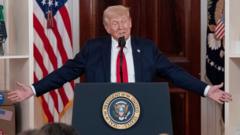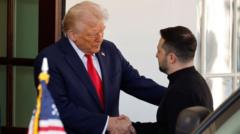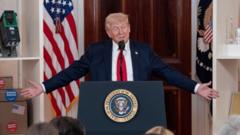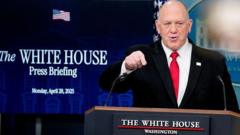Amidst late-night diplomacy and transactional dealings, Trump reshapes U.S. global relations.
**Trump's Unconventional Start: A New Era of American Diplomacy**

**Trump's Unconventional Start: A New Era of American Diplomacy**
In the first 100 days of Trump's second term, his foreign policy marks a profound shift.
The dawn of President Donald J. Trump’s second term has been marked by a strikingly unconventional approach to foreign policy, characterized by unpredictability and a transactional mindset. As America remains in the grips of a chaotic global landscape, Trump’s interactions with both allies and adversaries showcase a distinctly exploitative demeanor that is altering traditional diplomacy.
In a revealing incident unfolding in the early hours of a Munich hotel, one of Vice President JD Vance's aides sought to engage a senior Ukrainian official for an urgent meeting aimed at finalizing a minerals extraction deal. The urgency of the request highlighted the administration's aggressive agenda, but the official resisted, indicating the late hour and the lack of readiness to discuss. Ultimately, even with the proposal still unapproved, the scheduled meeting with President Volodymyr Zelensky proceeded the following day, embodying the fraught and erratic nature of relations under Trump’s leadership.
The signed minerals agreement shortly thereafter serves as a textbook example of the shift towards a new American statecraft—interventions perceived as almost imperial. This sentiment is echoed throughout Trump’s early foreign policy actions, which appear more inclined to dismantle existing alliances and exploit opportunities to suit U.S. objectives, all while the global order that prevailed since World War II seems ever more precarious.
From NATO alliances to international trades, Trump’s foreign policy trajectory raises alarm bells among European officials, who fear the withdrawal of American military presence could become a reality. Meanwhile, the ramifications of his heavy tariffs have prompted strategic retaliations from nations like China, complicating relationships and impacting global supply chains.
As this first 100-day period unfolds, the evolution of Trump's diplomatic tactics serves as a challenging test for global leaders as they navigate the intricacies of this new form of governance. With each procedural attempt, the stage is set for a world increasingly defined by transactional politics over lasting partnership.
In a revealing incident unfolding in the early hours of a Munich hotel, one of Vice President JD Vance's aides sought to engage a senior Ukrainian official for an urgent meeting aimed at finalizing a minerals extraction deal. The urgency of the request highlighted the administration's aggressive agenda, but the official resisted, indicating the late hour and the lack of readiness to discuss. Ultimately, even with the proposal still unapproved, the scheduled meeting with President Volodymyr Zelensky proceeded the following day, embodying the fraught and erratic nature of relations under Trump’s leadership.
The signed minerals agreement shortly thereafter serves as a textbook example of the shift towards a new American statecraft—interventions perceived as almost imperial. This sentiment is echoed throughout Trump’s early foreign policy actions, which appear more inclined to dismantle existing alliances and exploit opportunities to suit U.S. objectives, all while the global order that prevailed since World War II seems ever more precarious.
From NATO alliances to international trades, Trump’s foreign policy trajectory raises alarm bells among European officials, who fear the withdrawal of American military presence could become a reality. Meanwhile, the ramifications of his heavy tariffs have prompted strategic retaliations from nations like China, complicating relationships and impacting global supply chains.
As this first 100-day period unfolds, the evolution of Trump's diplomatic tactics serves as a challenging test for global leaders as they navigate the intricacies of this new form of governance. With each procedural attempt, the stage is set for a world increasingly defined by transactional politics over lasting partnership.






















